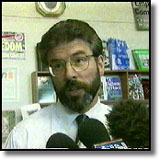
|
IRA Ceasefire BeginsThe new IRA ceasefire, intended to win a seat for its political wing, Sinn Fein, at the multi-party talks on the future of Northern Ireland, began at 12.00 BST on Sunday.At church services across the province, Catholics and Protestants have been praying that it will last longer than the truce declared in August 1994. That was abandoned 17 months ago when the IRA exploded a bomb in the Docklands area of in London. On Saturday the paramilitaries had faxed a statement to the Dublin newsroom of the Irish broadcaster RTE, announcing that they had "ordered the unequivocal restoration of the ceasefire". The republican paramilitaries added that they "want a permanent peace and therefore we are prepared to enhance the search for a democratic peace settlement through real and inclusive negotiations". The governments in London and Dublin welcomed the IRA's announcement. The US President, Bill Clinton, promised strong American support for the peace process. Unionist politicians however remained sceptical of the durability of the peace process.
Sinn Fein Gets Ready to Join TalksThe truce opens the way for Sinn Fein, the political wing of the IRA, to take part in the peace talks. Government officials will be getting in touch soon. Republicans intend to use their offices at the Stormont talks venue from Monday, but they will not be allowed into the talks proper until six weeks have passed.
In the interim, the Government will seek to assuage Unionist concerns, but as things stand the Unionists are expected to reject the Government's latest proposals on decommissioning paramilitary arms when they come up for a vote on Wednesday. On Monday, Tony Blair will meet with Unionist leaders to try and persuade them to talk with Sinn Fein. The Democratic Unionist Party has laready made it clear that the most pressing issue is decommissioning. "The basis for Sinn Fein entry to a talks process should be that they have undertaken a permanent and complete cessation of their violence and that they have begun the process of handing over their weaponry," he said.
McGuinness: "Not A Single Bullet"Sinn Fein's chief negotiator, Martin McGuinness, said on The World This Weekend on BBC Radio that all those involved in the process leading up to the ceasefire had been conscious of the need to remove any ambiguities in the Government's position on issues such as decommissioning."We have been assured that the decomissioning issue has been removed now as a precondition for talks," he said - but he acknowledged that it remained a difficulty for Unionists. Mr McGuinness also told Sky Television that he did not believe the IRA would hand over a single bullet. "The IRA have said thay they will not decommission a single bullet and I have not heard any statement from them saying they have changed their position on that." The President of Sinn Fein, Gerry Adams, had earlier described the ceasefire announcement as "momentous". Speaking at a rally near Sinn Fein's headquarters in West Belfast on Saturday, Mr Adams said Sinn Fein would join the talks with the creation of a united Irish Republic as "our primary objective", and predicted the struggle was "only just beginning". Between 300 and 400 people turned out to hear Mr Adams speak, a crowd hardly comparable to the thousands who took to the streets to greet the last IRA ceasefire in 1994.
"All of us have the responsibility nevertheless to get to know each other, to understand each other and to resolve this through a process of dialogue," he added.
Ceasefire Had Been ExpectedThe IRA statement was widely expected, after Mr Adams had announced on Friday that he had provided a detailed report and assessment to the IRA and urged its leadership to "restore its cessation of August 1994".
The two-page statement outlines the terms on which Sinn Fein, the political wing of the IRA, believes peace can be built. Mr Adams stressed the importance of a commitment by the British and Irish governments to inclusive talks without preconditions. The last IRA ceasefire began in September 1994, but in February 1996, after 17 months of peace, the IRA resumed armed hostilities, saying it was frustrated that Britain had refused it a political voice in talks.
|
Diana, Princess of Wales, 1961-1997
Conference 97
Devolution
The Archive
News |
Issues |
Background |
Parties |
Analysis |
TV/Radio/Web
Interactive |
Forum |
Live |
About This Site
News |
Issues |
Background |
Parties |
Analysis |
TV/Radio/Web
Interactive |
Forum |
Live |
About This Site
© BBC 1997 |
politics97@bbc.co.uk |




